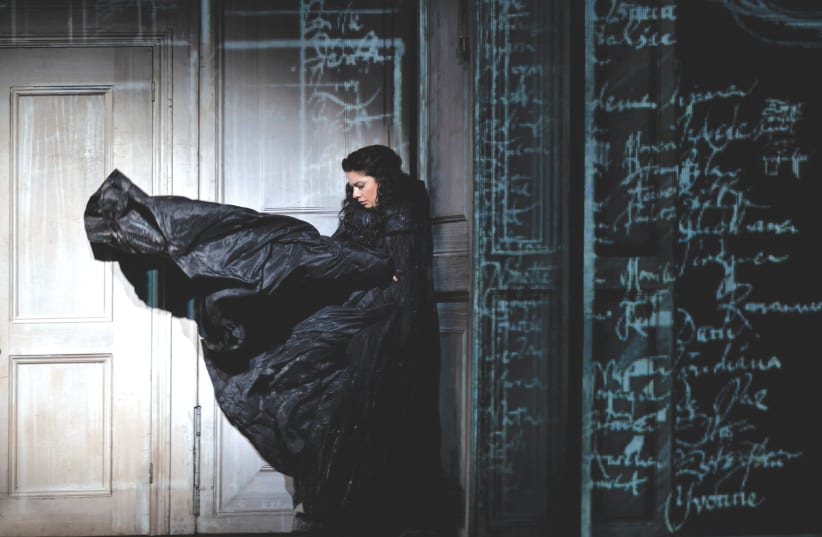DON GIOVANNIIsraeli OperaTel Aviv, March 19
Don Giovanni can smell women. His need to document the names of his conquests, large women and small, young maidens and crones, was illuminated for us as these names were scribbled in light on the set during the Israeli Opera’s premiere of Mozart’s Don Giovanni.
Donna Elvira (Carmela Remigio) seemed pained when she touched her own name after Leoprello (Paolo Bordogna) explained to her this is his master’s obsession (“Madamina, il catalogo è questo” aria). Oddly, Leoprello informs her that he, the servant, compiled it. Whose hand penned these names then? The master or his helper? Don Giovanni might read the list but Leoprello gets a thrill from writing it.
The brilliant video designs of Luke Halls, which showed names becoming ink blotches and then morphing into blood red during the overture, spell the emotional abyss created by the relationship between the two men.
Don Giovanni is a sadist. When he wolfed down food his pleasure hinged on knowing his servant is starving, yet stands watching him offering another plate. Leporello covets the life his master has. When the opera began, we heard him express his disgust with his fate. “Night and day, I stay up late, get no thanks, nor food, nor sleep,” he sang during the “Notte e giorno faticar” aria, “I would rather be the master, this is not a life for me.”
Despite the abuse, when divine retribution appears, Leoprello attempts to save his master. “Say that you are busy,” he implored him, yet, the compulsion was too strong. Don Giovanni accepted the hand of death and dined in hell.
A perfected multi-layered production
Danish director Kasper Holten has perfected a multi-layered production where the sum is much greater than its parts. The dresses worn by the heroines of Mozart’s opera, like Donna Anna’s dress in the final act, play on the dialog between ink stains and blank pages, creating a bauble that reflects the entire lit-up opera tree, so to speak.
The set designed by Es Devlin is highly functional, the staircase is used by Don Giovanni (German Enrique Alcantars) to lure Zerlina (Daniela Skorka) away from her groom, Masetto (Yair Polishook). It is also a spatial representation of the appeal the wealthy, high-born man holds for a country girl.
To appease Masetto, Don Giovanni offered him and his friends “chocolate, coffee, ham!” Each delicacy extracted a delighted gasp from the everyday men and women who came to their friend’s wedding.
DON GIOVANNI’S tragedy and unique appeal are that he really is a man underneath the narcissist damage. In the ads for this production, Don Giovanni’s mouth is blood red. With this organ, he charmed his victims by speaking, then drained them dry. He is able to stab a man, the Commendatore (Petros Magoulas). Then watch the dying man reach out and not extend his own hand.
Mozart created two male characters in this opera who are nebekhs (unfortunates). Don Ottavio (Long Long) is a cuckold. Masetto is on the verge of losing his bride. Yet, the other model of what it means to be a man, to use force and get your way, leads to self-destruction.
When Masetto is about to hit his bride out of his own self-loathing, due to his social class and having been beaten by Don Giovanni, it is the aria “Batti, batti, o bel Masetto” which soothes him. “Beat me, beat me, oh dear Masetto”, sang Skorka, “beat your poor Zerlina. I will stand here like a lamb.” Yet because he is a nebekh, he does not hit her and she is able to offer him consolation in the next aria (“Vedrai, carino”). There is a special elixir in a loving heart, she sang, which no medical doctor can prescribe. You can’t beat it out of a person and you can not cheat to get it.
It is this love which is beyond Don Giovanni. Perhaps this lack drove him to write a false history where he is always winning. When Donna Anna (Julia Maria Dan) held the shattered bust of her father the Commendatore, she pleaded with him not to be angry at her (“Non mi dir bell’idol mio” aria). The aria can also be used to address Don Giovanni, who hid on stage and listened but this usage of it loaded the words with more emotions.
Does she still love her dead father and pleaded with him not to be angry at her for marrying Don Ottavio? Or is she secretly addressing Don Giovanni and seeking to explain why she will make the right choice for her and marry a man she does not love because he promises to be her defender?
This visually stunning opera enjoys brilliant performers, each excelling in his or her own role, under the baton of conductor Karl-Heinz Steffens. Those lucky enough to sit close to the orchestra pit will see him gently lead the musicians to the point where the set turns on its hinges, the video projections end and a sinner is cast to hell in what might be a gigantic wooden coffin.
The next performances are on March 27 at 6 p.m., March 29 at 8 p.m. and March 30 at 6 p.m. Note the opera is three and-a-half hours long with one intermission. NIS 195-445 per ticket. For more information and tickets, call 03-692-7777. Sung in Italian with English and Hebrew subtitles. The photograph used here were created by Maya Iltus during the Israeli Opera photography workshop.
